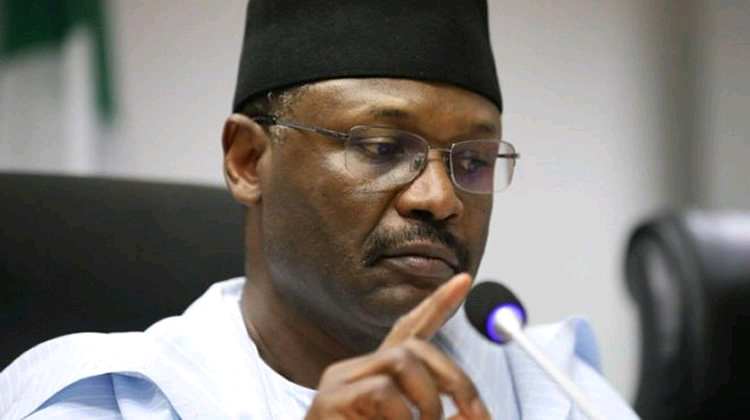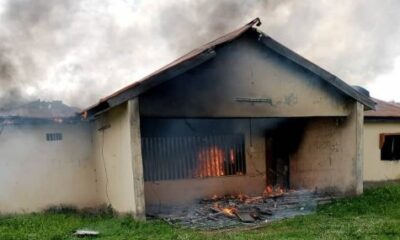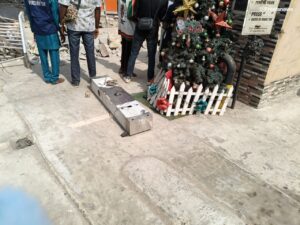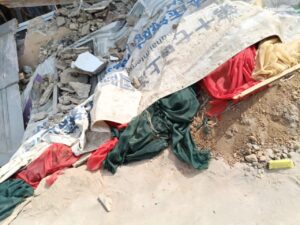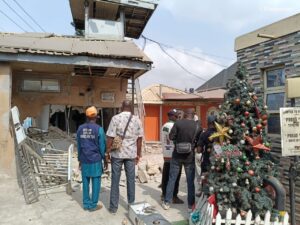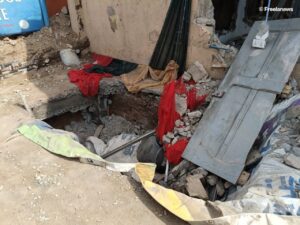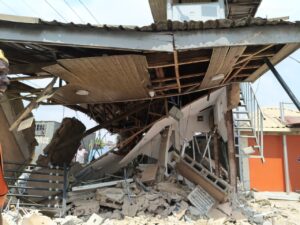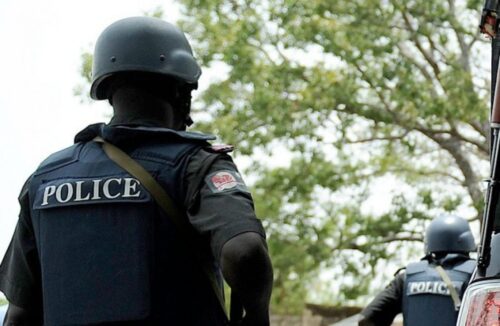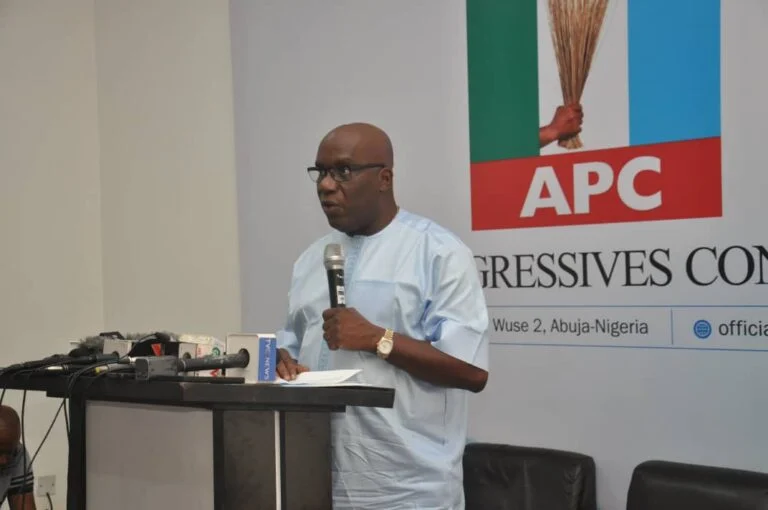The Independent National Electoral Commission has lost no fewer than 9,836 smart card readers in over 42 attacks on its offices and staff in three years.
Also, more than 1,149 persons, including INEC employees and security officers were killed in the three elections held in 2011, 2015, and 2019. Ballot papers, cubicles, and other materials were similarly destroyed.
Last Friday, an INEC worker identified as Anthony Nwokorie, was shot dead by gunmen while conducting the continuous voter registration in the White Uboma Local Government Area of Imo State.
A viral video showed the hoodlums forcing registrants to lie on the ground while destroying registration materials and vowing that elections would not hold in the South-East.
Following the violent assaults on its assets and staff, the electoral body has expressed fears over the 2023 elections, stating that there would be no results at polling units where violent incidents were orchestrated.
The Resident Electoral Commissioner in Akwa Ibom State, Mike Igini, warned that no return would be made where violence was deliberately precipitated to undermine the electoral process.
Describing the attacks on the commission as regrettable, the resident electoral commissioner assured Nigerians that the body was devising strategies to protect its offices, assets, and personnel ahead of the 2023 general election.
Again, a lawyer, said it was a disgrace that the political elite prepared for elections as if going to war, noting that the election period should be a time of stock-taking and Election Day, a day for renewing the journey of the country for a new direction.
Responding to a question about what was being done to better protect INEC employees, assets, and voters, he said a risk assessment would be conducted to evaluate hazards and risks before the general election, including “mapping of persons of interests and so on,” by the Inter-Agency Consultative Committee.
Igini stated, “There are things that will be done but much of it cannot be a matter for publication. However, it is important, if we must reassure the voting public for the commission to work with stakeholders to ensure that a speedy example is made with some people to convey the message to the public that there is zero-tolerance for such hazards and that voters will not only be protected but also seen to be protected.”
Asked if results in places that recorded violent incidents would be canceled, the REC said, “There has to be an election first before talking of result cancellation. Where violence is orchestrated deliberately to undermine the process, there will be no return made and nothing to cancel.
“Cancellation of election results is a sensitive process that follows a step-wise statutory procedure of auditing because as I pointed out above, political actors may also foment violence for electoral purposes. If results are justifiably canceled, it will be such as not to reward deliberately orchestrated electoral violence.”
On whether there would be special security arrangements for electoral officials during the 2023 polls, Igini said, “If necessary, yes; if the risk analysis requires special measures, they have to be in place for the affected area, otherwise, the commission will have to give notice as we have always done in the past that the conditions are not conducive.”
Investigations indicated that the electoral body had lost assets estimated at billions of naira to violence carried out by thugs and other hired hoodlums.
According to INEC, over 41 attacks, excluding the one in Imo State on Friday, have been carried out against its offices across 14 states since the 2019 general election, with the South-East recording 13 attacks.
The attacks which started in Abia on May 9 spread to Enugu and Ebonyi, with three incidents each; Imo, with two attacks; and Anambra and Abia with one each, and in Bayelsa and Akwa Ibom states.
In all, the electoral body recorded nine attacks in 2019, 21 incidents in 2020, and over 12 as of May 2021. It also lost 9,836 smart card readers, 345 ballot boxes, and 135 voting cubicles, among other assets.
For instance, on February 12, 2019, shortly before the general election, two containers loaded with 4,695 smart card readers were destroyed along with other sensitive materials in a mysterious fire at the Anambra State headquarters of INEC.
The commission estimated in its budget that each card reader cost N167, 063 while each memory card cost N6,000.
It was estimated that based on INEC’s budget for such sensitive materials, the loss incurred was about N847m which also included batteries and Secure Access Module cards.
Similarly, on September 10, 2020, just before the Ondo State governorship election, about 5,141 card readers were destroyed in a fire at the INEC head office in Akure.
Based on the budget estimates, the Akure fire was expected to have cost INEC nothing less than N900m. Weeks before the election on February 3, 2019, the INEC office in the Isiala-Ngwa South Local Government Area of Abia State was burnt down in mysterious circumstances.
In the same state, the commission’s facilities in the Arochukwu Local Government Area were vandalized in October 2020 while that of Aba South was completely burnt in December.
The electoral body’s office in Ohafia was also set ablaze on May 9, 2021, while the one in the Essien Udim Local Government Area of Akwa Ibom was razed on May 2, 2021. Items destroyed include 345 ballot boxes, 135 voting cubicles, megaphones, water tanks, and office furniture.
On the eve of the 2019 general election, INEC’s newly constructed prototype local government office in Ibesikpo Asutan was burnt down, while two more offices in the Mkpat Enin and Eastern Obolo LGAs were also bombed.
In Ebonyi, on March 9, 2019, INEC’s Registration Area Centre at Ezza North LGA was set ablaze by hoodlums. On February 10, 2019, its office in Qua’anpan LGA was gutted by fire while ballot boxes, cubicles, PVCs, and other sensitive materials were burnt. The fire was said to have been caused by negligence
At the INEC headquarters, Abuja, the Department of Electoral and Party Monitoring was completely burnt on April 17, 2020, while in Kano, on April 20, 2021, the data processing center was burnt along with the voter register, laserjet printers, computers, inverters, and other items.
According to INEC, fire incidents were recorded in Akwa Ibom (four), Abia (three) Anambra (two), Imo (two), and in Borno, Ebonyi, Jigawa, Kano, Ondo, Plateau, and Rivers states between February 2019 and May 2021.
The losses were not limited to property as any fewer than 1,149 persons, including electoral officers, police officers, and voters were killed between 2011 and 2019 during post-election violence in Niger, Kaduna, Rivers, Benue, and other states.
1,149 persons were killed in three elections
A former Inspector-General of Police, Hafiz Ringim, had said 520 persons, including nine National Youth Service Corps members, died in the violence that followed the outcome of the 2011 polls won by President Goodluck Jonathan in Niger, Jigawa, Bauchi, Kano, and Kaduna while hundreds were displaced.
Also, an estimated 626 persons, including one INEC worker, were killed across Nigeria in the six months between the start of the election campaign and the commencement of the 2019 general and supplementary elections, the Nigeria Civil Society Situation Room said.
According to the report, the North-West region recorded the highest number of deaths with 172 killed during the elections, while the North-East followed with 146 fatalities. Also, the report revealed that the South-South and North-Central had 120 and 111 fatalities, respectively.
Three INEC workers were also killed in Benue State in 2015.
Commenting on the huge human and material losses, Igini, citing research on electoral violence, suggested the violence might have ‘electoral and quasi-electoral objectives.’
On the areas considered risky, the commissioner said the commission would be determined by pre-election analytics as presented by security agencies.
He added, “This will be determined by pre-election analytics; sometimes, some areas that appear quiet now may be evaluated as more hazardous given the intelligence on political actors and their activities. So some factors and dimensions can alter such analytics, some of these can be moving targets as the electoral ambiance changes.
“Painfully, the unhappy truth about our tragic situation is the fact that the political elite is behind so many of the worrying tendencies threatening and putting our democracy at risk.
Unfortunately, those who didn’t raise a finger when the journey of this country and the prospect of democracy were less certain during the long fight for democracy are the ones responsible for all these disturbing tendencies.”
He also commented on the calls for a referendum in some parts of the country.
Igini stated, ” I listened to an audio recording in circulation on social media, in which one of the people involved in the violence, is saying they want a referendum, yet INEC is talking of an election. You can see a clear exhibition of a lack of understanding of the issues they are agitating about and the danger of ill-informed individuals now acting as philosophers.
“Why attack the body that is solely responsible for the conduct of election and referendum in the country? The killing of the INEC employees that will conduct a referendum that you are even calling for if granted is despicable. It is only INEC that has the statutory responsibility to conduct a referendum, so why kill the staff and destroy the commission’s property? This is nothing but crass ignorance. If a referendum that this group is calling for is granted, which body will conduct it and with which materials?
He also explained security arrangements during elections.
The REC said, “The idea of security personnel not being allowed to carry arms within polling units, during election management, is to create an atmosphere devoid of fear; the need to avoid shooting people under the guise of what they call accidental discharge. Voters’ rights and access must not be fettered so that freely they can exercise their franchise.
“However, there is a circle of higher arm-bearing security protection around the perimeter of election venues that can be called into action if the need arises. They ensure that armed persons usually political thugs are restricted from access to polling units.”
Igini also explained that the number of security agents that would be required would depend on the security assessment of specific areas.
He stated, “That (the number of security agents) will depend on the risk assessments as they affect different areas. Given what we now see, it may be necessary for security agencies to put in additional early-warning security as well as response and recovery measures, the use of devices such as drones with control centers, among others.”

 BIG STORY2 days ago
BIG STORY2 days ago
 BIG STORY3 days ago
BIG STORY3 days ago
 BIG STORY3 days ago
BIG STORY3 days ago
 BIG STORY3 days ago
BIG STORY3 days ago
 BIG STORY1 day ago
BIG STORY1 day ago
 BIG STORY5 days ago
BIG STORY5 days ago
 BIG STORY2 days ago
BIG STORY2 days ago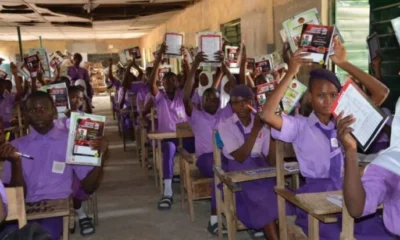
 BIG STORY3 days ago
BIG STORY3 days ago




